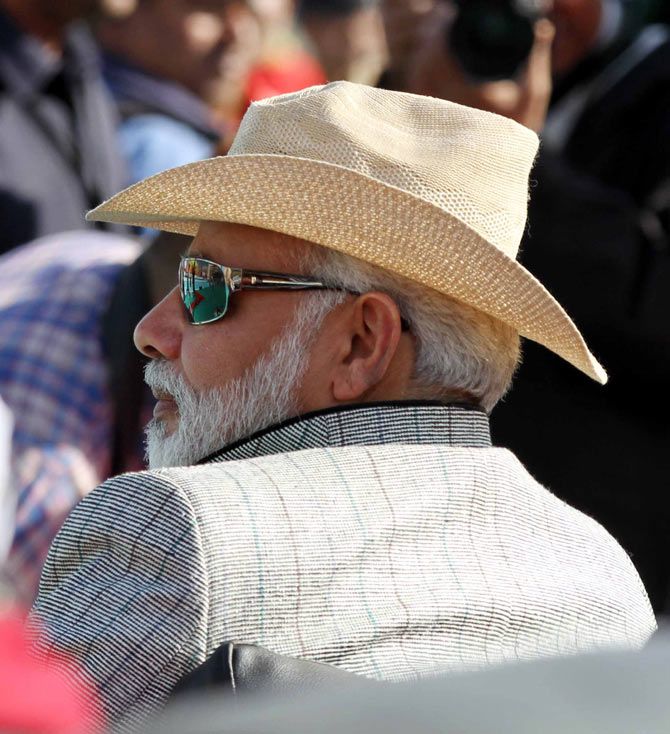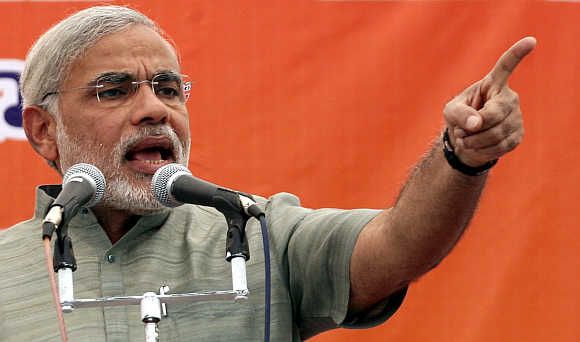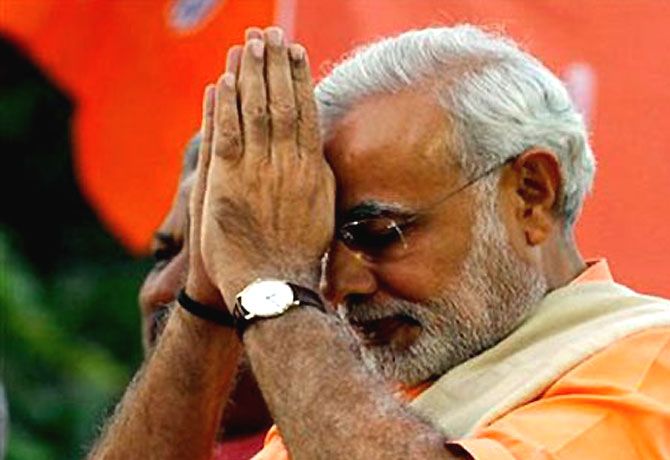.jpg?w=670&h=900) It is a rock 'n' roller's dream to ‘sell out The Garden,’ but for a foreign politician to pack New York City’s most famous sports and entertainment arena is another thing entirely.
It is a rock 'n' roller's dream to ‘sell out The Garden,’ but for a foreign politician to pack New York City’s most famous sports and entertainment arena is another thing entirely.
Prime Minister Narendra Modi, on his first trip to New York as leader of the world's most populous democracy, will draw perhaps the largest crowd ever by a foreign leader on US soil when he takes the stage on Sunday in Madison Square Garden before a crowd forecast to total more than 18,000 people.
Thousands more are expected to pack New York's Times Square to watch his address in Hindi on big screens as well as smaller viewing parties around the country and on TV in India.
The Indian diaspora hopes this visit by a leader who was until recently barred from the United States will signify India's importance not only on these shores but in the wider world too.
The event is being emceed by prominent members of the Indian American community, Nina Davuluri, who has just relinquished her crown as Miss America 2014, and TV journalist Hari Sreenivasan.
"Indian citizens and diaspora over the world are hopeful that this (Modi) administration will cut bureaucracy and focus on people," said Dr. Dinesh Patel, chief of arthroscopic surgery at Massachusetts General Hospital in Boston, who arrived in the United States more than 50 years ago.
.jpg?w=670&h=900)
Patel, who says he was given an award for work in education by Modi, a fellow Gujarati, added: "People are passionate to see the new leader. Another Narendra is coming to this country to let the USA know what India is about."
The first Narendra was Swami Vivekananda, a 19th-century philosopher and monk who propagated the Hindu faith in the United States. Modi often cites a speech by Vivekananda, born Narendra Nath Datta, to the Parliament of Religions in Chicago in 1893, as a source of inspiration.
"Let us remember the words of Swami Vivekananda and dedicate ourselves to furthering the cause of unity, brotherhood and world peace," Modi wrote September 11 to his 6.5 million followers on Twitter.

India's economy, the third largest in Asia, has struggled to recover from sub-par growth, shackled by layers of bureaucracy anathema to the diaspora. Modi's general election triumph in May was driven in large part by his entrepreneurial mantra.
On the eve of his US visit, tensions remain between the Washington and New Delhi over trade and spying.
The 64-year-old former chief minister of Gujarat was denied a US visa in 2005 over sectarian rioting that killed more than 1,000 people, mainly Muslims, three years before. Modi, who denies wrongdoing, has been exonerated by a Supreme Court probe.
Washington was late to warm to Modi. Its ambassador to India only met him in February, when opinion polls already put his nationalists on course for a big election win.
Diligent diaspora

India's US diaspora is a highly educated population of nearly 3.2 million, making up about 1 per cent of the US population, according to latest US Census Bureau data.
As a group, they are more likely to be hooked to the internet than their fellow Americans, far more likely to have a college or professional degree and twice as well off with an average household income of more than $100,000.
"Indians are generally very ambitious and entrepreneurs," said Mike Narula, the founder, president and chief executive officer of Long Island, New York-based Reliance Communications, a distributor of mobile telecom devices and accessories.
Narula, who came to the United States 17 years ago, first working in the garment industry, now has his own company with more than, 200 employees.

He's part of the host committee for Modi's visit to Washington, where the prime minister will meet with President Barack Obama on Monday and Tuesday.
"We attempted to do business in India. I hope Modi will look into streamlining issues such as VAT, the role of foreign direct investment and find a way for American businesses to not have to go through 19 red tape bureaucracies," he said.
While Indian Americans are well represented in America's professional class, they are less visible in the military.
Some 0.1 per cent serve in the armed forces compared to 0.4 per cent of Americans as a whole.
"The diaspora does very well on entrepreneurship, but not as much on the physical sacrifices. It is not just enough to be a citizen and taxpayer," said Raj Bhandari, a 48 year old Mumbai-born banker from New Jersey.
"As a larger community I would like it to be more engaged on the front lines."





.jpg)





